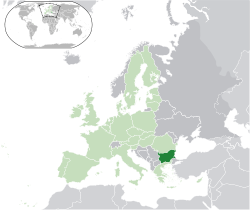Cancelled Russian Nuclear Plant May Cost Bulgaria €1 Billion
By EurActiv
(EurActiv) — Russia’s Atomstroyexport is seeking €1 billion in compensation following Bulgaria’s decision to shelve plans for building the Belene nuclear power station near the River Danube. Dnevnik, EurActiv’s partner publication in Bulgaria, reports.
Bulgaria in March abandoned plans to build its second nuclear power plant based on Russian technology.
The Russian daily Vzglyad quoted the Bulgarian ambassador in Moscow, Boyko Kotsev, as saying that Bulgaria cancelled the plans due to a lack of funds.

But Belene may cost dearly even if the project is cancelled. Atomstroyexport increased its compensation request from the country’s National electric company (NEK) to €1 billion, according to a report by Dnevnik. A case over Belene has been opened at the International Court of Arbitration in Paris, the paper reported today (11 September). The Russian company had earlier sought €58 million.
The Russian news agency ITAR-TASS reported that the new demands made by Atomstroyexport include the cost of construction, equipment, storage and expenses for the EU stress tests following the Fukushima disaster in Japan. The company is also seeking compensation for services contracted after its Bulgarian client stopped payments.
Bulgaria’s relations with Russia in the energy field appear as a complex puzzle. Bulgaria depends on Russia for 89% of its petrol, 100% of natural gas and all of the nuclear fuel needed for its Kozloduy nuclear power station, which has two functioning reactors.
Bulgaria is also negotiating an agreement with Gazprom for long-term natural gas supplies. But a deal reached this summer, in which Sofia agreed to link its commitment to the Russian-backed South Stream pipeline to win a more favourable gas price, raised eyebrows in Brussels.
Besides Belene, Russia has interest in building the South Stream gas pipeline project and the Burgas-Alexandroupolis oil pipeline on Bulgarian territory (see background). The oil pipeline project is reportedly on hold.
A political context
At that time the Belene project was cancelled, the opposition Bulgarian Socialist Party (BSP) slammed the cabinet for what it called a decision “influenced by some embassies, including the American one.”
Prime Minister Boyko Borissov in return blasted the Socialists for having decided to go ahead with the project without a clear understanding of its final price. The cash-strapped country can hardly afford large-scale investments, most economists argue.
The future of Belene remains undecided. The BSP says it has gathered 800,000 signatures in favour of holding a referendum for building the nuclear power plant according to plans. The authenticity of the signatures is now being checked by the country’s authorities, and if the legally required number of 500,000 valid signatures is attained, the poll could take place sometime in the spring of 2013.
According to many analysts, BSP has plans to use the campaign in favour of Belene as a means to motivate its electorate ahead of the parliamentary elections, due in the summer of 2013.
